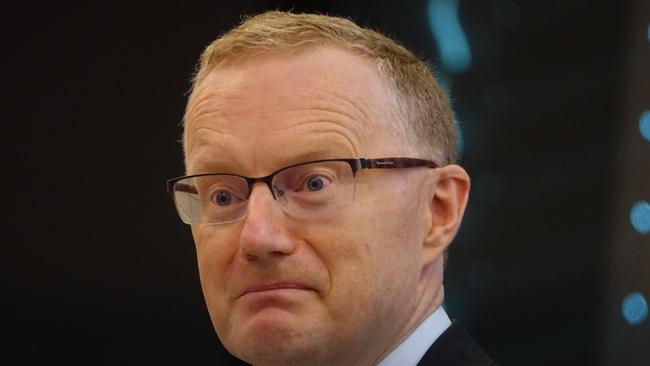RBA warns bitcoin is ‘a speculative mania’
The RBA has launched a scathing attack on bitcoin and says it’s unlikely to play a meaningful role in the future of payments.

Reserve Bank boss Phillip Lowe has launched a scathing attack on bitcoin, labelling rampant trading in the cryptocurrency a “speculative mania” and adding that it’s unlikely to play a meaningful role in the future of payments.
Bitcoin is the first of a number of cryptocurrencies that are decentralised and allow users to make transactions anonymously and securely. Launched in 2009, bitcoin has seen an exponential rise in its price over the last 12 months, from $US1000 to over $US17,000, with speculators continuing to pile in.
Speaking at the 2017 Australian Payment Summit in Sydney Wednesday, Dr Lowe said bitcoin’s usefulness from a payments perspective was limited at best and the cryptocurrency brought with it a host of other problems.
“The value of bitcoin is very volatile, the number of payments that can currently be handled is very low,” he said.
“There are governance problems, the transaction cost involved in making a payment with bitcoin is very high and the estimates of the electricity used in the process of mining the coins are staggering.
“When thought of purely as a payment instrument, it seems more likely to be attractive to those who want to make transactions in the black or illegal economy, rather than everyday transactions,” he added.
“So the current fascination with these currencies feels more like a speculative mania than it has to do with their use as an efficient and convenient form of electronic payment.”
The recent surge in the value of bitcoin, fuelled in part by a move to provide futures contracts on the currency, has prompted fears of a market bubble that could create financial instability if it collapses.
Dr Lowe joins a long queue of those from international central banks and academia raising a red flag around cryptocurrency risks.
The CEO of Melbourne’s Blockchain Centre, Martin Davidson said the advent of bitcoin and blockchain technology posed a threat to sovereign state governments given their decentralised nature.
“I feel for the RBA, and for regulators,” Mr Davidson told The Australian. “There’s a system of control that’s been in place for some time. And now there’s a decentralised system competing with the centralised system. The decentralised has a lot more opportunities and advantages over the one central entity, it has ability to reach everyone, regardless of governments or economic policies.
“If you take it to its logical conclusion, the government’s influence over the people and monetary system ends up being defunct. I know people who live on bitcoin, they load their credit card with cryptocurrency so they have no need to have Australian dollars any more.”
Dr Lowe also ruled out any immediate plans for the RBA to issue a digital form of the Australian dollar, adding the case for it has yet to be established. However the RBA was weighing the pros and cons of one day making such a move.
A so-called eAUD — an electronic form of the dollar not backed by a paper bill — could operate in tandem with physical banknotes.
“It is possible that the RBA might, in time, issue a new form of digital money — a variation on exchange settlement accounts — perhaps using distributed ledger technology,” Dr Lowe said.
Leigh Travers, CEO of ASX-listed blockchain firm DigitalX, told The Australian the benefits of eAUD include the transparency over money flow and the ability to attract GST over the cash economy.
“It will reduce transaction costs and advocate real time payments which is great for retail merchants. There will be no need for a physical wallet – just your mobile phone, making it convenient and efficient for consumers,” he said.
“There will be greater oversight over bank capital adequacy to manage shocks to the system, including improving anti money laundering capabilities. While it has some questions ethically it could improve the oversight over welfare recipients spending habits.
“Opportunities come with risks too. There will be costs involved in implementing a new form of currency. There will also be the management of other regulatory and insurance concerns around custodian responsibilities and reduced revenue from seniorage”
Dr Lowe said the use of privately-issued electronic tokens representing dollars was feasible, but history showed people prefer to hold centrally-backed currency in periods of uncertainty or stress.
“It is hard to see them being issued as cryptocurrency tokens under a bitcoin-style protocol, with no central entity standing behind the liability,” Dr Lowe said.
“So, while a privately issued eAUD is conceivable, experience cautions that there are significant difficulties and dangers associated with privately issued fiat money.”
Dr Lowe said while the demand for digital currencies was growing as the use of cash subsided, the RBA saw little benefit in embracing the world of cryptocurrencies.
With Dow Jones and AAP





To join the conversation, please log in. Don't have an account? Register
Join the conversation, you are commenting as Logout